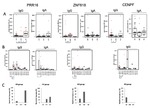Mostrar o rexistro simple do ítem
Association of serum anti-centromere protein F antibodies with clinical response to infliximab in patients with rheumatoid arthritis: a prospective study
| dc.contributor.author | Lourido Salas, Lucía María | |
| dc.contributor.author | Ruiz-Romero, Cristina | |
| dc.contributor.author | Picchi, Florencia | |
| dc.contributor.author | Diz-Rosales, Naomi | |
| dc.contributor.author | Vilaboa Galán, Sergio | |
| dc.contributor.author | Fernández-López, Carlos | |
| dc.contributor.author | Pinto-Tasende, José A. | |
| dc.contributor.author | Pérez-Pampin, Eva | |
| dc.contributor.author | Regueiro, Cristina | |
| dc.contributor.author | Mera-Varela, Antonio | |
| dc.contributor.author | González, Antonio | |
| dc.contributor.author | Hambardzumyan, Karen | |
| dc.contributor.author | Saevarsdottir, Saedis | |
| dc.contributor.author | Nilsson, Peter | |
| dc.contributor.author | Blanco García, Francisco J | |
| dc.date.accessioned | 2021-04-07T10:47:47Z | |
| dc.date.issued | 2020-06-30 | |
| dc.identifier.citation | Lourido L, Ruiz-Romero C, Picchi F, Diz-Rosales N, Vilaboa.Galán S, Fernández-López C, et al. Association of serum anti-centromere protein F antibodies with clinical response to infliximab in patients with rheumatoid arthritis: a prospective study. Semin Arthritis Rheum. 2020;50(5):1101-1108 | es_ES |
| dc.identifier.issn | 0049-0172 | |
| dc.identifier.uri | http://hdl.handle.net/2183/27685 | |
| dc.description.abstract | [Abstract] Background: One-third of rheumatoid arthritis (RA) patients demonstrate no clinical improvement after receiving tumor necrosis factor inhibitors (TNFi). The presence of serum autoantibodies is a hallmark in RA and may provide information on future response to treatment. The aim of this prospective study was to search for novel serum autoantibodies useful to predict clinical response to TNFi. Methods: The autoantibody repertoire was profiled on RA patients treated with TNFi as a first line of biologic therapy (N = 185), who were recruited in three independent cohorts. The presence and levels of autoantibodies in serum at baseline were analysed in association with the clinical response after 24 weeks follow-up. A multiplex bead array built using antigens selected from an initial untargeted screening was employed to identify the autoantibodies on a discovery cohort (N = 50) and to verify and validate the results on verification (N = 61) and validation (N = 74) cohorts. Non-parametric tests, meta-analysis and Receiver Operating Curves (ROC) were performed in order to assess the clinical relevance of the observed findings. Results: Novel autoantibodies were associated with the clinical response to TNFi, showing different reactivity profiles among the different TNFi. The baseline levels of IgG antibodies against Centromere protein F (CENPF), a protein related to cell proliferation, were significantly (p<0.05) increased in responders (N = 111) to infliximab (IFX) compared to non-responders (N = 44). The addition of anti-CENPF antibodies to demographic and clinical variables (age, sex, DAS28-ESR) resulted in the best model to discriminate responders, showing an area under the curve (AUC) of 0.756 (95% CI [0.639-0.874], p = 0.001). A further meta-analysis demonstrated the significant association of anti-CENPF levels with the patient's subsequent response to IFX, showing a standardized mean difference (SMD) of -0.65 (95% CI [-1.02;-0. 27], p = 0.018). Conclusions: Our study reveals for the first time the potential of circulating anti-CENPF antibodies to predict the clinical response to IFX before starting the treatment. This finding could be potentially useful to guide therapeutic decisions and may lead to further studies focusing on the role of CENPF on RA pathology. | es_ES |
| dc.description.sponsorship | Instituto de Salud Carlos III; PI14/01707 | es_ES |
| dc.description.sponsorship | Instituto de Salud Carlos III; PI16/02124 | es_ES |
| dc.description.sponsorship | Instituto de Salud Carlos III; PI17/00404 | es_ES |
| dc.description.sponsorship | Instituto de Salud Carlos III; PI19/01206 | es_ES |
| dc.description.sponsorship | Instituto de Salud Carlos III; CIBER-CB06/01/0040 | es_ES |
| dc.description.sponsorship | Instituto de Salud Carlos III; RETIC-RIER-RD16/0012/0002 | es_ES |
| dc.description.sponsorship | Instituto de Salud Carlos III; PRB3-ISCIII-PT17/0019/0014), | es_ES |
| dc.language.iso | eng | es_ES |
| dc.publisher | Elsevier | es_ES |
| dc.relation | info:eu-repo/grantAgreement/EC/FP7/305549 | es_ES |
| dc.relation.uri | https://doi.org/10.1016/j.semarthrit.2020.06.010 | es_ES |
| dc.rights | Atribución-NoComercial-SinDerivadas 3.0 España | es_ES |
| dc.rights.uri | http://creativecommons.org/licenses/by-nc-nd/3.0/es/ | * |
| dc.subject | Rheumatoid arthritis | es_ES |
| dc.subject | Autoimmunity profiling | es_ES |
| dc.subject | Response | es_ES |
| dc.subject | Infliximab | es_ES |
| dc.subject | Antigen arrays | es_ES |
| dc.title | Association of serum anti-centromere protein F antibodies with clinical response to infliximab in patients with rheumatoid arthritis: a prospective study | es_ES |
| dc.type | info:eu-repo/semantics/article | es_ES |
| dc.rights.access | info:eu-repo/semantics/embargoedAccess | es_ES |
| dc.date.embargoEndDate | 2021-06-30 | es_ES |
| dc.date.embargoLift | 2021-06-30 | |
| UDC.journalTitle | Seminars in Arthritis and Rheumatism | es_ES |
| UDC.volume | 50 | es_ES |
| UDC.issue | 5 | es_ES |
| UDC.startPage | 1101 | es_ES |
| UDC.endPage | 1108 | es_ES |
Ficheiros no ítem
Este ítem aparece na(s) seguinte(s) colección(s)
-
INIBIC- REUMA - Artigos [184]









